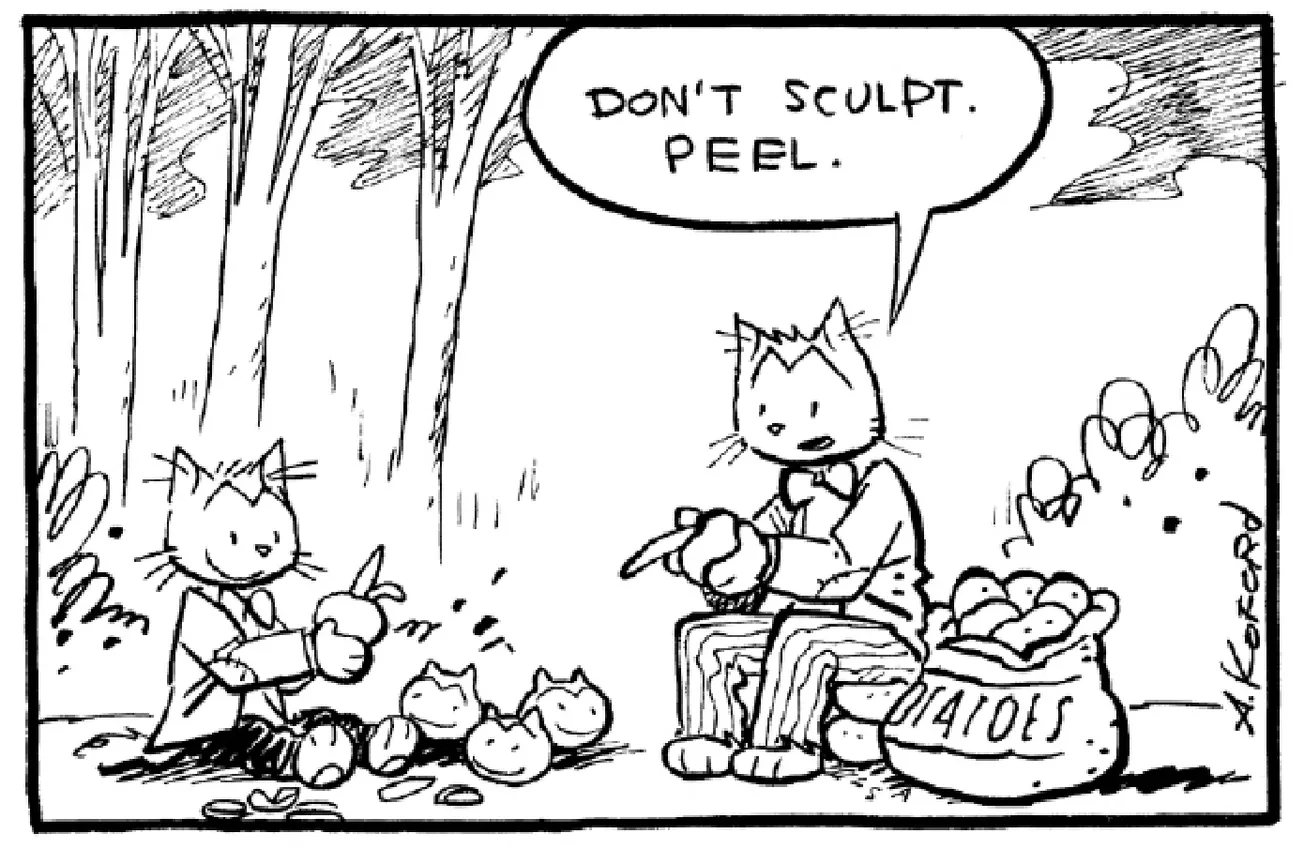Raymond slurped his lukewarm instant coffee and grimaced.
“At least we got coffee,” Dave said. “Til it runs out.”
“This ain’t coffee.”
Dave picked up the glass canister and turned it so Raymond could see. “Look at this guy, grinning like an idiot. He’s damn happy. He’s grateful.”
Brett the intern stood in the corner, watching. Raymond put his hand on Brett’s shoulder.
“Don’t listen to Dave. He still has dreams of the old ways. He’ll fill you with false hope.”
“For crying out loud, Raymond! Give the kid a break!”
Raymond ignored his boss. Such distinctions meant less than nothing, now. “C’mon kid.”
They walked down the long office hallway, Raymond’s arm around the intern the whole time.
“Hell of a thing, what happened. Shutdown happens your first week on the job.”
The intern didn’t say anything. He never said anything.
“I never thought it would happen,” Raymond said, “especially not in the middle of a
workday. I thought they’d at least send us home first. But they didn’t.” Raymond leaned in, and the kid smelled his Sanka-breath. “Bet you wish you’d called in sick!”
The intern looked inside the open office doors as they walked by, offices that had slowly become ersatz studio apartments—complete with webs of laundry hanging from the ceiling, andhalf-eaten bags of vending machine chips strewn on the carpet.
“I never got to show you around,” Raymond said. “Well, now we got time. Nothing but
time.”
The intern nodded, rubbing his stubble. He hadn’t showered in a week and was subsisting on nothing but rationed candy bars.
They stopped at an office. “This here’s Martha. She’s the one you hear every night
around five. Used to be quitting time. Hey, Martha, what was that you sang for us last night?”
“‘Controversy.’ Tonight, I’m trying to write down all the lyrics I can remember from ‘Get Into The Groove.’”
Raymond raised his mug in salute, then they walked on. “When the internet went out, I realized something. Do you know what I realized Brett? Every day, in a million little ways, the internet had started to replace our memory.” Raymond squeezed the intern’s shoulders for emphasis. Then he paused to take a mouthful of Sanka. “UGH. If nothing else, not having the internet has made us, what you call, reformulate all the stuff in our heads that we like. You know? No choice but to commit it all to memory.”
They kept walking, and Raymond kept pontificating. “You don’t know what it was like.
Your generation always had the internet. But there was a whole world before it. Look out.”
Raymond sharply kicked a binder carelessly dropped in the hall. “Things, Brett, were mysterious. When you didn’t know something, and it wasn’t in the ol’ Funk & Wagnall’s—that’s an encyclopedia—you were out of luck. Maybe you’d run into someone who knew it, or maybe you just never were gonna find out. You had to accept it, and make more room in the old noggin for the stuff you liked.
“People who were good at trivia were prized. Champions. If you knew the real lyrics to
‘Louie, Louie,’ then you were the king in the land of the blind, my friend.”
“Louie, Louie?”
“Old song. We’ll get Martha to sing it. Then,” Raymond said, “POW. Anybody could
look up anything at the drop of a hat. Your brain became like your tonsils. Useless, expendable. Not anymore!”
They reached the end of the hall, and stood in the doorway of a half-lit conference room. Inside, a wavy-haired man sat at the head of a long table. In each chair, sat a disheveled office worker, paying rapt attention.
“…That day, when he approached the door, he knocked. It took every fiber of strength in his being to supplicate himself in this way, but he knew he could no longer simply barge in with impunity. Those days were over.”
“What’s this about?” Brett asked.
Their trance broken, several listeners turned around, glaring.
Dave mimed apology, then whispered, “That’s Ron. He used to work in the mailroom,
and everybody thought he was a dork because he’d memorized every Seinfeld episode. Now, people come to listen. And remember.”
“Wow.”
“Damn right, wow. That’s talent. All those spreadsheets and PowerPoint decks I did?
This is what brings people together. This is what lasts.”
Eyes opened wide like Barrymore, Ron leaned in to face his rapt acolytes. “And
then”—he paused expertly—“the great comedian asked him for his keys back.”
The crowd gasped.
Not Raymond. “Ah, I’ve heard this one.” They walked down another hallway to
Raymond’s office; Raymond turned to go in, then turned back. “Y’know, Ron’s not going to live forever. One day when he’s gone, and I’m gone, and Dave and Martha—when all us old timers are just so much dust, you’ll get an office like mine. And you’ll be the one to remember all this history and culture. So keep your ears open. And
remember.”
The office’s intercom system crackled to life, and Martha’s voice filled the air. “Ladies
and gentlemen, please be prepared to ‘Get Into the Groove’…”
The door to the conference room closed. Raymond stood there at the entrance to his
office, looking at nothing, preparing to receive. Brett heard him whisper, “God, I hope she can remember ‘Disco Duck’.” ◊
JEFFREY KULIK is a lifelong Chicagoan and public servant who has previously been published in The American Bystander and Public Organization Review.




